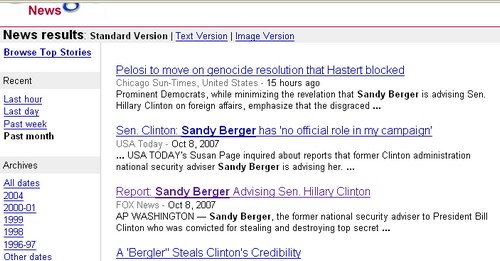Is there anything more vacuous than a bunch of Republican candidates arguing about who is the real conservative?
Why, yes, there is. The news coverage of that argument is much more brainless! It makes these candidates look like a bunch of Einsteins in comparison.
Consider this ABC news article, “Thompson whacks Guiliani on Home Turf.”
Whacks? Whacks??? This isn’t slapstick. It’s criticism. it’s debate. Why does ABC demean it by calling it “whacking”? (No, don’t answer that. We know why.)
Here are the airheads at ABC News:
Thompson’s salvo, which he planned on repeating Monday evening at a meeting of New York’s Conservative Party, fit in perfectly with the latest back and forth among the GOP presidential candidates about who is authentically Republican, and who is faking it.
It’s more than traditional campaign rhetoric — they are challenging one another’s very legitimacy as Republicans. It’s a dynamic that seems natural in this race, with no clear Republican front-runner who can claim overwhelming support among the GOP’s conservative base.
Some analysis, huh? They tell us there is a fight, but avoid any mention that there is some substance to it. But when ABC news lets the candidates speak for themselves, we get to some important issues:
Giuliani campaign press secretary Maria Comella responded, “Mayor Giuliani is the only candidate who does more than just talk about the importance of Republican principles — he actually has the track record to back it up.
“It’s easy to throw around meaningless rhetoric, but quite another thing to stand up to a Democratic majority and successfully cut taxes, control spending and reform welfare.”
Good question, that. It’s one thing to talk Republican principles. But so many Republicans fold when faced with real opposition from the leftwing hate machine. I’ll bet I would if I was in their shoes, on account of I’m too easy-going. This is one reason you don’t want me to be President, even though I have a disconcerting habit of being right about things. You need somebody who has been tested under fire.
And there is more. It isn’t the Lincoln-Douglas debates by any means, but it’s a whole lot more meaningful than the ABC reporting on the topic. Maybe ABC would do well to just shut up and let the candidates speak if it can’t do any better than words like “whack” and “salvo.”
Oh, btw, I don’t think there’s any more chance I’ll vote for Giuliani than that I’d ever vote for George W. Bush. I’m just saying he made a good point.
At least that ABC article gives us some nice photos of the four top GOP candidates. It made me realize that I don’t think I’ve ever seen any of those four on TV. I have no problem with it staying that way. And since I’m not watching the baseball postseason this year, it means I probably won’t go near a television until March Madness. So I’m going to fall behind in cultural literacy again.
